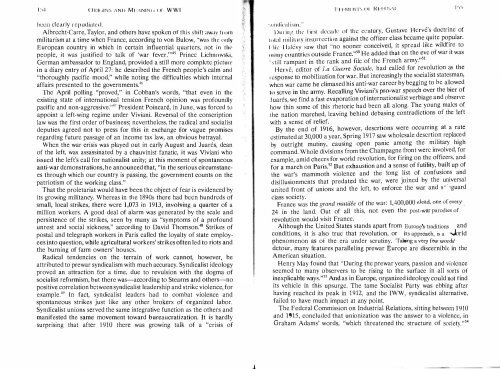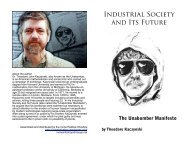CONTENTS - ouroboros ponderosa
CONTENTS - ouroboros ponderosa
CONTENTS - ouroboros ponderosa
Create successful ePaper yourself
Turn your PDF publications into a flip-book with our unique Google optimized e-Paper software.
1 :>- I ()]{ lt iINS ,'\NI I MI":\NIN( i (II" WWI<br />
ht;CI1 dearly rcpuoialcti.<br />
Albrecht-Carre, Taylor, and others have spoken of this shin away 110111<br />
militarism at a time whcn Francc, according to von Bulow, "was Ihe only<br />
Europcan country in which in ccrtain innuential quarters, not in Ill\'<br />
people, it was justified to talk of 'war [ever."''' Prince Lichnnwski,<br />
German ambassador to England, provided a still more complete picture<br />
in a diary entry of April 27: hc described the French people's calm and<br />
"thoroughly pacific mood," while noting the difficulties which internal<br />
affairs presented to the governments,"<br />
Thc April polling "proved," in Cobban's words, "that even in th"<br />
existing state of international tension French opinion was profoundly<br />
pacific and non-aggrcssive,"" President Poincare, in June, was forced tll<br />
appoint a left-wing regime under Viviani. Reversal of the conscription<br />
law was the first order of business; nevertheless, the radical and socialist<br />
deputics agreed not to press for this in exchange for vague promises<br />
regarding future passage of an income tax law, an obvious betrayaL<br />
When the war crisis was played out in early August and Juarcs, dean<br />
of the left, was assassinated by a chauvinist fanatic, it was Viviani who<br />
issued the left's call for nationalist unity; at this moment of spontaneous<br />
anti-war demonstrations, he announced that, "in the serious circumstances<br />
through which our country is passing, the government counts on the<br />
patriotism of the working class,"<br />
That the proletariat would have been the object of fear is evidenced by<br />
its growing militancy, Whereas in the 18908 there had been hundreds of<br />
small, local strikes, there were 1,073 in 1913, involving a quarter of a<br />
million workers, A good deal of alarm was generated by the scale and<br />
persistence of the strikes, seen by many as "symptoms of a profound<br />
unrest and social sickness," according to David Thomson," Strikes of<br />
postal and telegraph workers in Paris called the loyalty of state employees<br />
into question, while agricultural workers' strikes often led to riots and<br />
the burning of farm owners' houses,<br />
Radical tendencies on thc terrain of work cannot however be<br />
, ,<br />
attributed to prewar syndicalism with much accuracy, Syndicalist ideology<br />
proved an attraction tor a time, due to revulsion with the dogma of<br />
socialist reformism, but there was-according to Stearns and others-no<br />
positive correlation between syndicalist leadership and strike violence, for<br />
example," In fact, syndicalist leaders had to combat violence and<br />
spontaneous strikes just like any other brokers of organized labor,<br />
Syndicalist unions served the same integrative function as the others and<br />
manifested the same movement toward bureaucratization, It is hardly<br />
surprising that after 1910 there was growing talk of a "crisis of<br />
'i .<br />
.<br />
.-.<br />
·,\'lHlicalislII. "<br />
I )Ul'ill)!, the firs! dccadt: of the cc:ntury) Gustave Herve's doctrine of<br />
[, ,Ial Illilil'" Y insulTection against the officer class became quite popular.<br />
I Clie Ilakv; saw that "no sooner conceived, it sprcad like wildfire to<br />
",allY countries outside France,"" He added that on the eve of war it was<br />
"slill rampant in the rank and file of the French army,""<br />
Herve, editor of i.a Cuerre Sociale, had called for revolution as the<br />
response to mobilization for war. But increasingly the socialist statesman,<br />
when war came he climaxed his anti-war career by begging to be allowed<br />
to serve in the army, Recalling Viviani's pro-war speech over the bier of<br />
J uares, we find a fast evaporation of internationalist verbiage and observe<br />
how thin some of this rhetoric had been all along, The young males of<br />
the nation marched, leaving behind debasing contradictions of the left<br />
with a scnse of relief.<br />
By the end of 1916, however, desertions were occurring at a rate<br />
estimated at 30,000 a year, Spring 1917 saw wholesale desertion replaced<br />
by outright mutiny, causing open panic among the military high<br />
command, Whole divisions from the Champagne front were involved, for<br />
example, amid cheers for world revolution, for firing on the officers, and<br />
for a march on Paris, " But exhaustion and a sense of futility, built up of<br />
the war's mammoth violence and the long list of confusions and<br />
disillusionments that predated the war, were joined by the universal<br />
united front of unions and the left, to enforce the war and so' 'guard<br />
class society.<br />
France was the grand muti!ee of the war: 1,4()(),000 «lead, one of every .<br />
24 in the land, Out of all this, not even the post-war parodies of<br />
revolution would visit France,<br />
Although thc United States stands apart from Europ!" s traditions<br />
and<br />
conditions, it is also true that revolution, or ills approach, is a . ...brld<br />
phenomenon as of the era under scrutiny, Taking a very few words'<br />
detour, many fe atures paralleling prewar Europe are discernible in the<br />
American situation,<br />
Henry May found that "During the prewar years, passion and violence<br />
seemed to many observers to be rising to the surface in all sorts of<br />
inexplicable ways,"" And as in Europe, organized ideology could not find<br />
its vehicle in this upsurge, The tame Socialist Party was ebbing after<br />
having reached its peak in 1912, and the IWW, syndicalist alternative,<br />
failed to have much impact at any point.<br />
The Federal Commission on Industrial Relations, sitting between 1910<br />
and 1915, concluded that unionization was the answer to a violence, in<br />
Graham Adams' words, "which threatened the structure of society,""






